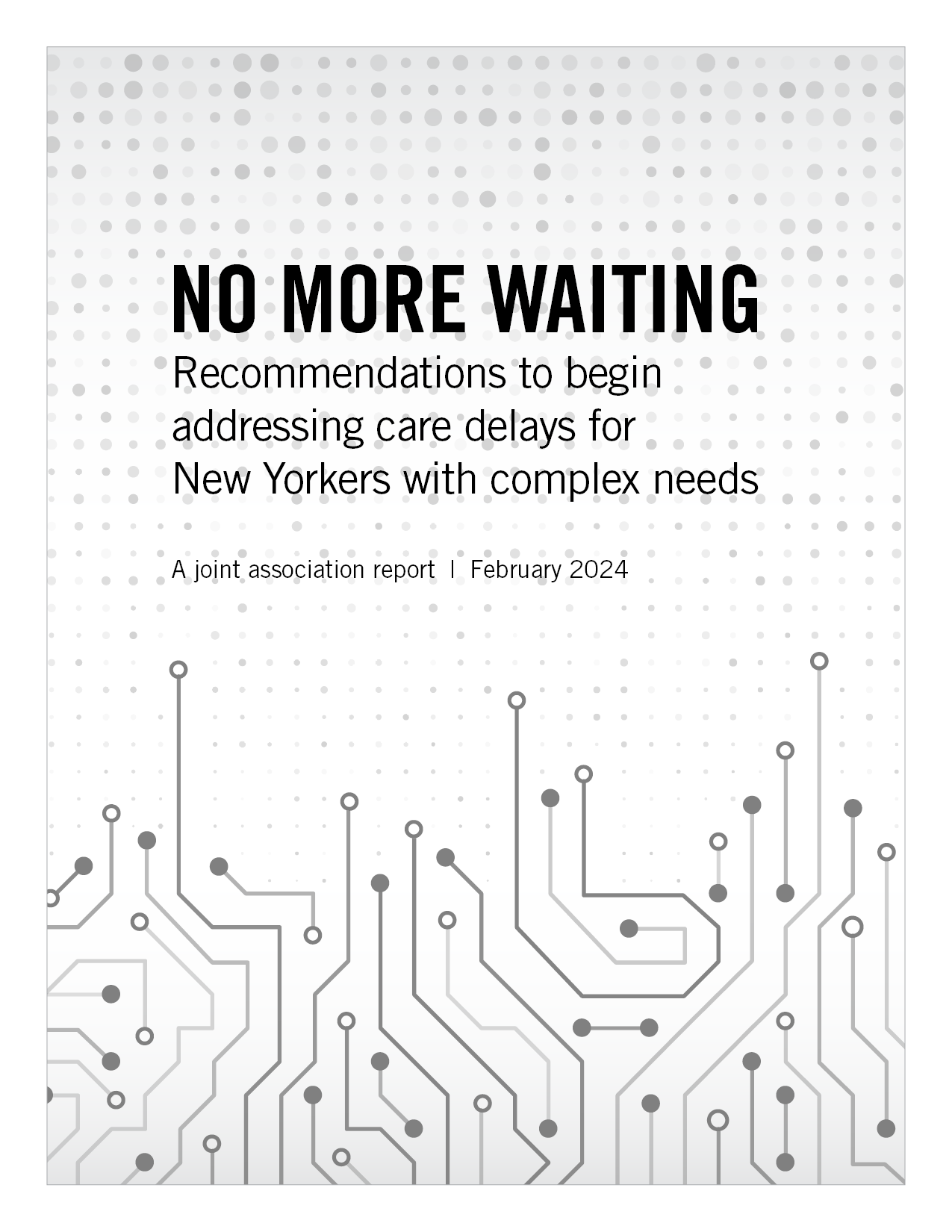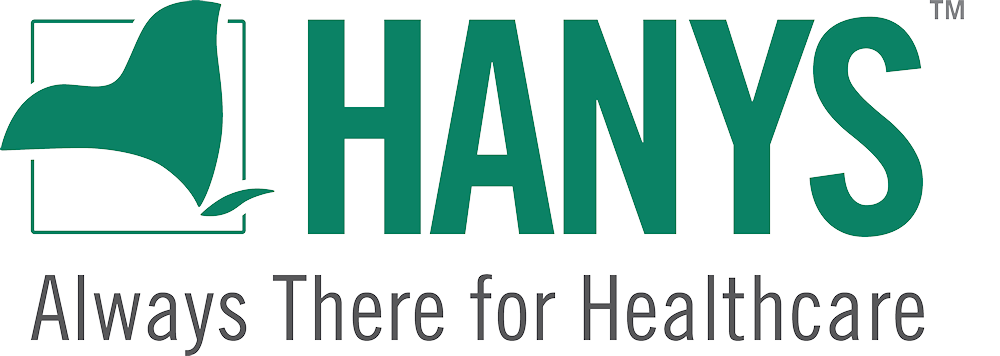Patients stuck in limbo for weeks, months, even years: 11 NYS associations advance recommendations to address care delays experienced by patients with complex needs
"No more waiting” report’s policy recommendations address limited care options, challenges in securing payment for essential services and difficulty navigating services overseen by various state agencies.
Eleven New York state associations representing a diverse range of healthcare providers issued a new report, No more waiting: Recommendations to begin addressing care delays for New Yorkers with complex needs. These policy recommendations are a result of a series of workgroup sessions convened by the Healthcare Association of New York State in 2023.

Children and adults with complex care needs continue to experience long delays in access to essential services. As a result, many are forced to seek care in hospitals as a last resort and become caught in limbo in emergency departments and hospital inpatient units for weeks, months and even years after they are medically ready for discharge.
These discharge delays are devastating for these patients and their families, limit access to acute and emergency care for other New Yorkers and result in enormous, unnecessary costs.
The participating associations urge state policymakers to support the achievement of more person-centered and equitable healthcare and social care systems for children, adults and families with complex care needs. The new report’s policy recommendations focus on:
-
creating and sustaining adequate care options;
-
eliminating payment obstacles; and
-
advancing ways for patients and providers to navigate multi-agency services more easily.
The convened associations will continue to work toward solutions and look forward to continuing to partner with policymakers, additional healthcare providers, consumers and all interested parties.
“Our 2022 data collection pilot identified over 500 patients at 52 of our hospitals, in just a 90-day period, who were medically ready for discharge for one month to over a year. Children, older adults and people living with intellectual and/or developmental disabilities or conditions requiring specialty medical care were most profoundly impacted,” said Bea Grause, RN, JD, president, Healthcare Association of New York State. “HANYS is grateful to the many partners who have joined us over the last several months to explore how to help reduce these delays and build a healthcare system that treats individuals living with complex care needs as the expectation, rather than the exception.”
"People with complex needs are just that — people. This report sets a path for those critical first steps needed to ensure New York's health system improves how it sees, understands and supports people whose care is currently limited by programs misaligned with the whole person and what their needs may be,” said Mike Alvaro, president and CEO, Cerebral Palsy Associations of New York State, Inc. “Putting the focus back on the person's needs, especially when a person with disabilities who has a co-occurring mental health diagnoses needs to access the health system, will go a long way toward ensuring equitable access to and improving complex care outcomes across the broad health system in New York state.”
“Adult Care and Assisted Living Communities provide seniors who need ongoing supervision and assistance with meals, personal care, medications, activities and housekeeping the ability to live as independently and autonomously as possible,” said Lisa Newcomb, executive director, Empire State Association of Assisted Living. “New Yorkers with complex care needs deserve equitable access to the unique services provided by these essential programs. Special Needs Assisted Living Residences could be a future solution with necessary, sustainable financial support.”
“Individuals with interdisciplinary and multilevel needs are often the most vulnerable, facing gaps, barriers and silos in the system that prevent person-centered service. Solutions identified by this workgroup are needed both at the macro program, coverage and policy levels, but then also, most critically in support of the service delivery level,” said Al Cardillo, president and CEO, Home Care Association of New York State. “We ask the State to enable and empower hospitals, home health providers, physicians, behavioral health and community providers to work in flexible and integrative ways that together bridge those gaps, create access, coordinate care and provide responsive, effective, compassionate and cost-saving services to these especially needy individuals.”
“Hospitalized older adults who are ready for discharge but need post-acute care cannot find available nursing home beds or home health care due to workforce shortages and chronic under-funding of these services. The problem is exacerbated by infeasible and rigid nursing home staffing mandates that inhibit staffing models tailored to the specialized needs of residents. The State must step up to address both reimbursement and regulatory barriers to care,” said James W. Clyne, Jr., president and CEO, LeadingAge New York.
“For many years some persons with mental disabilities have languished in emergency rooms and hospital wards because of the lack of appropriate discharge options and supports,” said Glenn Liebman, CEO, Mental Health Association in New York State. “We commend HANYS for convening several statewide associations representing providers and persons with disabilities to evaluate the many barriers to discharge and propose workable solutions.”
“New York’s mission-driven health and human services sector is committed to providing supports and services to all persons in the most integrated settings possible with highest commitment to quality, dignity and safety. Notwithstanding the challenges presented by the people with complex needs, the New York Alliance for Inclusion and Innovation sincerely believes that no person is impossible to serve appropriately, regardless of diagnoses,” said Michael Seereiter, president and CEO, New York Alliance for Inclusion and Innovation. “It is, however, only possible to serve these most complex and complicated individuals with coordinated cross systems collaboration, sufficient flexibility, thoughtful program design and other necessary resources. Without such elements, these individuals, especially people with intellectual and developmental disabilities, will be impossible to properly and safely serve in a community setting — regardless of the commitment of dedicated agencies and staff to try to do so. The recommendations in this report, coupled with the dedication of the people involved in the collaborative process to identify these solutions is a good first step to address such complex problems.”
“New York’s long-term care continuum, faced with historic labor shortages, is at a complex crossroads and this report highlights critical investments necessary to provide integrated quality care without barriers for our state’s most vulnerable residents, including those who reside in adult care facilities,” said Christina Audi, MHA, LNHA, executive director, New York State Center for Assisted Living. “Without sustainable financial resources for the state’s assisted living programs that accept Medicaid, providers will struggle to admit individuals who can benefit from their services, which costs less than admittance to a skilled nursing facility. Additionally, programs suitable for our resident population with conditions such as Alzheimer’s disease and other dementias must be made permanent to prevent unnecessary transitions in care and keep individuals in the least restrictive setting possible.”
"The emergency department is not the right place for a young person to stay after they are stable and ready for discharge, but too many of New York's children with mental health needs end up stuck there for weeks or even months,” said Kayleigh Zaloga, president and CEO, NYS Coalition for Children’s Behavioral Health. “We need to invest in the community-based services that enable young people to return home safely, create more robust communication and collaboration protocols across systems of care, and reform the payment structures that often stand between available care and a family's access to it."
“For too long, inadequate reimbursement rates and methodologies have reduced our workforce and stalled necessary programming to support individuals with significant mental health needs in the community, resulting in emergency departments serving as a safety net for children and adults with complex needs. Lengthy stays in emergency departments exacerbate mental health symptoms, and subjecting those in crisis to extensive wait times for treatment should no longer be looked at as a standard of care — we must do better,” stated Courtney L. David, executive director, NYS Conference of Local Mental Hygiene Directors, Inc. “We commend our partners at HANYS for including the local mental health departments in the development of these recommendations, which will serve as a step forward in correcting policy approaches that have strained our systems of care and the communities they serve.”
"New Yorkers need and deserve on-demand access to all types of healthcare, beginning with mental health and addiction prevention, treatment, recovery and harm reduction services. But at the present time, there are significant waiting lists for these services across our community-based service delivery system,” said Lauri Cole, MSW, executive director, NYS Council for Community Behavioral Healthcare. “This situation results in far too many New Yorkers having to either delay the care they need or seek services in more acute care settings. Unfortunately, we see and feel the consequences of delayed care in the numbers of overdose and suicides that continue to ravage our communities."
###
